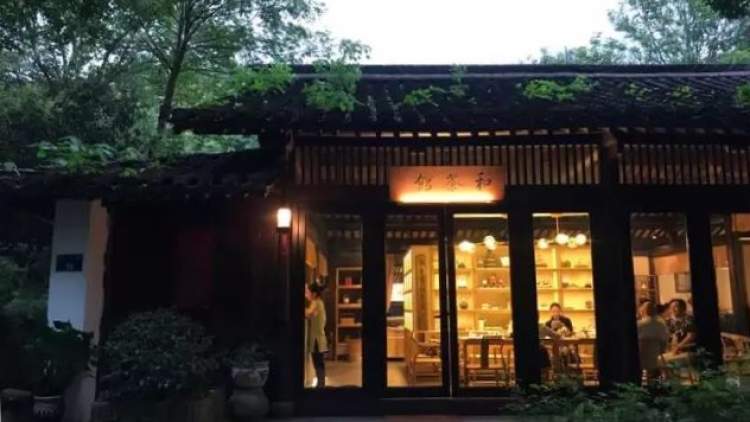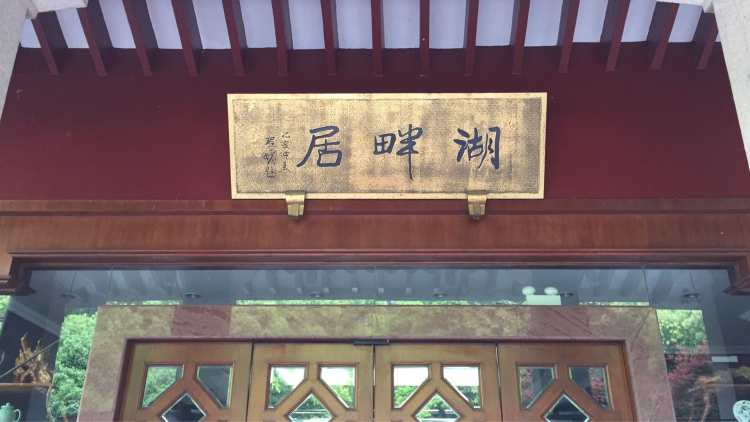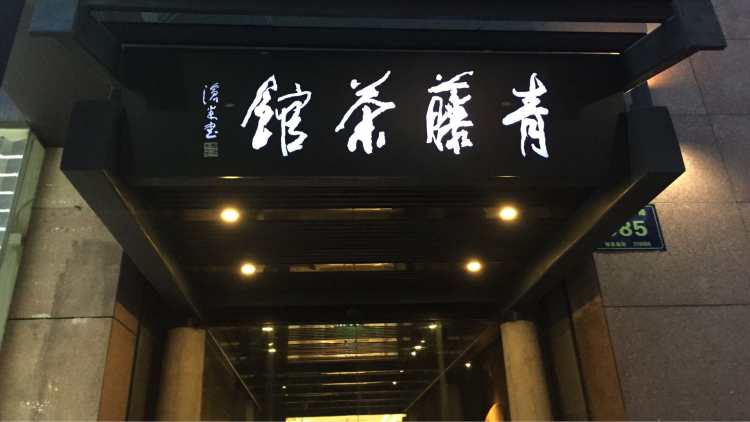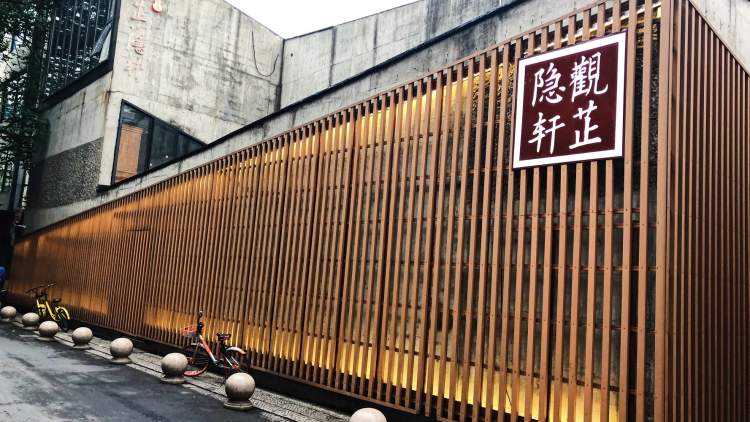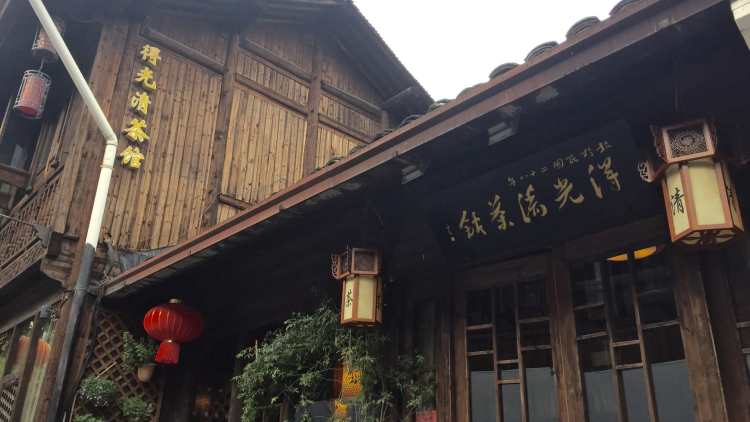Hangzhou's first He Tea House was opened in 1999 as a tea space with antiques on the old Renmin Road by the West Lake, created by designer Shi Guoqin. Today, He Tea House has two directly operated stores in Hangzhou, located at Aman West Lake and Banyan Tree Xixi. He Teahouse is regarded as the "cultural relics highland" of Hangzhou because of its collection of many antique-level tea utensils, and can be called one of the most cultural teahouses in Hangzhou.
Pang Ying, the owner of the Teahouse, is revered as one of the most influential tea people in Hangzhou, and she was a lover of antique tea utensils before she founded the Teahouse, and after more than ten years of learning the tea ceremony, she is now a well-known tea instructor in the industry. Pang Ying often holds tea lectures in the teahouse, which attracts many tea lovers to study and exchange here, which is suitable for friends who are interested in tea ceremony.
The tea space designed in the interior of the teahouse has the simple elegance of the Song and Ming dynasties, and still adheres to the traditional manufacturing process of mortise and tenon structure. After seven and a half years in operation, the Harmony Tea House at Aman Fayun closed for a period of time in mid-2017 and was redesigned and renovated to open for business. The updated Fayun store is still dominated by wooden furniture, and the lines of Ming-style furniture are as beautiful and simple as flowing water, and the whole teahouse is full of classical charm.
There are two kinds of water used to make tea in the teahouse, one is the local Hupao water, which is different from the general tea house or hired workers to fetch water, and the Hupao water of the teahouse is purchased in the water plant, and the factory treatment and inspection pay more attention to water quality and hygiene while retaining the sweet and soft taste of the spring water. The other is Nongfu Spring drinking water with Qiandao Lake in Zhejiang Province as the water source. In the brewing of West Lake Longjing, Jiuqu Hongmei two kinds of local tea, Hupao water is used, and other non-Zhejiang tea production areas use Nongfu Spring, which can also be regarded as a sense of ritual in the tea house in the selection of tea.
In 2018, there were two kinds of green tea from Shifeng and Meijiawu, and the price was 188 yuan. The traditional core production areas of West Lake Longjing are "Lion (Shifeng)", "Dragon (Longjing)", "Yun (Yunqi)", "Tiger (Tiger Run)", and "Mei (Meijiawu)". The largest Shifeng production area does not need to be repeated, Meijiawu, which occupies the name of "Mei" in Longjing, was separated from the "cloud" in the late Republic of China, and soon became a rising star. Although Meijiawu ranks at the bottom of the five major brands, it has the largest tea mountain area and the largest tea production, accounting for 30% of the total output of West Lake Longjing. Meijiawu is also the main production area of Longjing, the West Lake of Heteahouse, with the largest supply. In addition, there is a small amount of Zhejiang Longjing from the Xinchang tea area, and the price is 118 yuan per person. In addition to the West Lake Longjing, there are also four kinds of spring teas in the new tea, such as Biluochun, Huangshan Yemaofeng, Lushan Yunwu, and Taiping Houkui.
The oolong tea in the teahouse is of outstanding quality. One of the major categories is Wuyi rock tea, which is distributed between the 36 peaks and 99 rocks of Wuyi Mountain, and contains the "rock bone flower fragrance" with the traditional tea-making process of deep fermentation and heavy roasting. Da Hong Pao is the first of the five famous rock teas, originally taken from the Jiulong Cave on the steep cliff of the 6 shrub-type mother trees, the annual output of tea seven or eight taels, the yield is very small, now there are only 4 plants, now it is forbidden to harvest. Because the current Da Hong Pao is produced from the bamboo rock of Tianxin Rock, the cord is tightly knotted, even and strong, and the aroma is rich and long-lasting, and there is a rock rhyme. After brewing, the soup is orange and bright, and the taste is mellow. With the increase of brewing times, the sweetness of the throat gradually fades, and it can generally be brewed about seven or eight times in a row. In addition, there are iron arhats from Huiyuan pit, Wuyi cinnamon from Niulankeng, old fir daffodils from Huiyuan pit and hundred-year-old fir daffodils from Gujing, with prices of 288-388 yuan/pot (8 grams, 1~2 servings). The other category is the phoenix single fir produced in Chaoshan Phoenix Mountain, including Song single fir, honey orchid, white leaves, almond incense, ginger Huaxiang five kinds, the price is 288-488 yuan / pot (8 grams, 1~2 servings). In addition, there are two categories of Anxi Tieguanyin and Taiwan Oolong, which are rich in categories, and the quality of tea is above good. The tea house is a good place for those who love oolong tea.
Different from the general teahouse, it is equipped with a unified tea point, and the tea house will deliver different tea points according to the tea selected by the tea customer. Longjing tea is accompanied by osmanthus chestnut cake and fresh milk cake, which is fresh and refreshing and mellow tea taste, which neutralizes the soft and sweet taste of the cake. Zhengshan Xiaozhong, Jiuqu Red Plum, Qimen Black Tea and other black teas are paired with coffee mousse, and the taste of Chinese and Western combinations is different and fresh. Lao Jun Mei, Da Hong Pao and other oolong teas are paired with jujube paste cakes, and the jujube fragrance is matched with the pure Ganze of oolong tea, and the lips and teeth leave a lingering fragrance.
Aman Fayun's teahouse is housed in a detached old building, and the entire building still retains the traditional wooden structure of Jiangsu and Zhejiang, with a thatched roof from the outside. After stepping into the teahouse, you will be in the ancient space made of logs - the tables, chairs and rattan trellises are made of solid wood, you can see ink paintings, calligraphy and other decorative ornaments everywhere, the wooden shelves are furnished with a dazzling array of antique tea sets, and a Buddha statue in the inner hall of the teahouse is even more Zen-like, which makes people immediately precipitate their mood. Most of the tea service providers in the tea house are women, and the uniformity of professional standards needs to be improved. Although the Fayun store is located in a winding path and a secluded place, it is still popular, and it is necessary to make a reservation in advance when arriving at the store on holidays.



